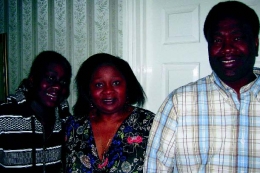The Dimbo family were at the centre of a famous test case on residency rights for parents of Irish-born children. Having moved out of asylum seeker accommodation in Dublin, CATHERINE REILLY reports from their new home in Leixlip - and discovers a family glad to have survived but struggling for work.
IN THE Dimbo sitting room, a solitary framed photo sits on the mantelpiece. It’s not the usual fare: no wedding hats, confirmation suits or birthday balloons appear in an image capturing a happy trio on the day that time stopped standing still.
The photo shows Ethelbert and Ifedinma Dimbo alongside their Irish son George after they emerged from the Four Courts on 2 May last year. It was the day the five-judge Supreme Court ruled that the Minister for Justice had failed to give substantial reasons for his decision to issue deportation orders against the Dimbo parents and those of another Irish child, Chuka Paul Oguekwe.
“On that day, I was very, very happy about this country,” reveals Ethelbert. “The judicial system is there to fight for your rights – that shows that the country is good. I thank God today for the judges, I thank God.”
His wife Ifedinma came to Ireland to complete a Master’s degree in sociology at University College Cork in 1995, and was given residency in Ireland following George’s birth here in 1996, as was her legal entitlement. However, for personal family reasons she left Ireland in 1998, before returning with George in 2002, followed by husband Ethelbert a few months later.
She had expected that her residency status, based on having an Irish-born child, would be renewed as a matter of course. However, the Depart-ment of Justice treated the application as a fresh submission, not as a renewal, and refused it.
In early 2005, the Irish-Born Child residency scheme was briefly reopened as a last-gasp regularisation process for non-Irish parents who had Irish children before the change in citizenship legislation, which had been overwhelmingly voted for by the Irish people and brought into effect on 1 January 2005. But Ethelbert and Ifedinma were refused, as were hundreds of others, on the basis that they had not been continuously resident in the State since the birth of their child.
The Dimbos, at that stage penniless, decided to enter the asylum process as a last resort. For much of that time, they were based in one room at Hatch Hall asylum seeker hostel in Dublin, sustained only by the belief that they had to fight on behalf of their Irish son George, now a first year student at Marian College in Dublin.
The remarkably well-adjusted youngster is particularly intriguing as most of the children involved in the ‘IBC’ cases are babies or toddlers and unable to speak their minds. George, however, was active in demonstrations with his parents and in approaching politicians for help with his situation.
Indeed, when New York Times reporter Jason deParle visited Ireland in February last year to do an immigration-related feature, he based his entire piece on the Dimbos, describing them as “the kind of memorable figures who might have tumbled” from a Roddy Doyle book.
Following last May’s court decision, which ruled in their favour, the Dimbos were invited to apply for residency, which was granted. They moved out of the Hatch Hall accommodation centre last October. But what they hadn’t counted on when forced to stay economically idle during the boom years, was that their permission to work would coincide with one of the darkest eras in Ireland’s financial history.
“When we got the papers, things got very bad regarding jobs,” says Ethelbert, whose background is in mechanics. “It’s given me a big concern. It’s very, very difficult and I feel very bad about it.”
Wife Ifedinma adds: “We’ve gone to the employment office and they said ‘Look, there’s no jobs.' My husband said: ‘What if it’s cleaning?’ They said anything is not there, that people are being laid off everyday.”
The Nigerian woman is looking into the possibility of pursuing a PhD, examining migrants’ access to health services, and notes that she would probably be well down this road had court cases not interfered.
It once again spotlights the Department of Justice’s decision to contest the Dimbo case, rather than let the few hundred affected applicants enter the labour and training market while times were still good.
The offshoot is that many recent grantees have their residency card in one hand, and nothing but social welfare benefits in the other. And as Ethelbert Dimbo points out, some residency holders – most notably single mothers and those without a second-level education – are prime candidates for long-term social welfare dependency. The institutional affects of asylum seeker accommodation will also have mental health consequences for significant numbers, he adds.
Overall, though, despite being in a difficult situation themselves, the Dimbos do have the advantage of being well educated and prepared to work below their qualification level when times are tough. “Any job,” says Ethelbert, “I’d take any job.”
They are also glad to be away from the asylum seeker accommodation which they compare to “an open prison”. Ifedinma comments: “In Hatch Hall, you would eat, sleep and wash according to the programme. Now everything you do is for yourself and nobody thinks for you.
“It’s up to you now to look for work as it is not healthy to survive on welfare – you are still circulating below the ladder, you haven’t started climbing... But you can’t stand still because there’s a recession. People are losing jobs, but some people are getting jobs. So you live with the hope that tomorrow will be better than today.”












